Nội Dung Chính
- 1 Worship is a beauty in the cultural customs of the Vietnamese people. According to the ancients, choose direction of the altar is a sacred thing, related to the fortune of the family. Therefore, placing the altar in the wrong direction will have a great impact. Therefore, through the following article, Mua and Sell will provide readers with information about the best direction to place the altar.
- 1.1 1. How is the direction of the altar understood?
- 1.2 2. Factors affecting the choice of altar direction
- 1.3 3. How to determine the direction of the altar
- 1.4 4. Direction of different types of altars
- 1.5 5. Taboos when choosing the direction of the altar
- 1.6 6. What to do if the altar is placed in a bad direction?
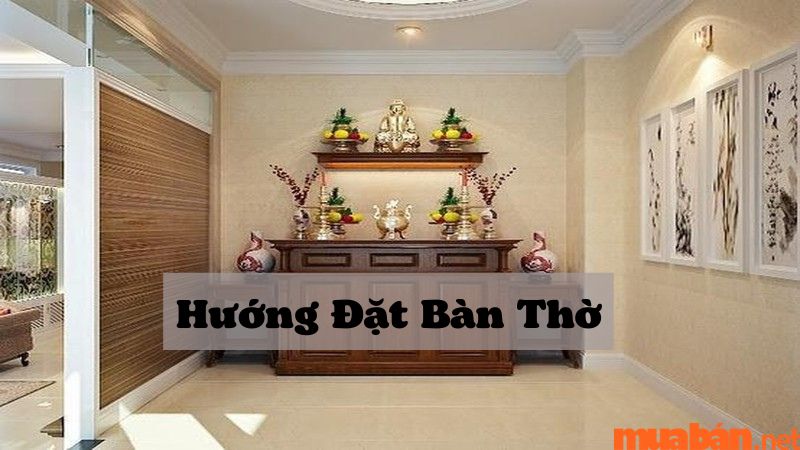
1. How is the direction of the altar understood?
In the simplest way, the direction of the altar is the direction the altar looks out. The direction of the altar will be on the same side as the back of the worshiper when standing facing the altar. Based on this and the age and destiny of the owner, feng shui experts calculate and determine the best direction to place the altar.
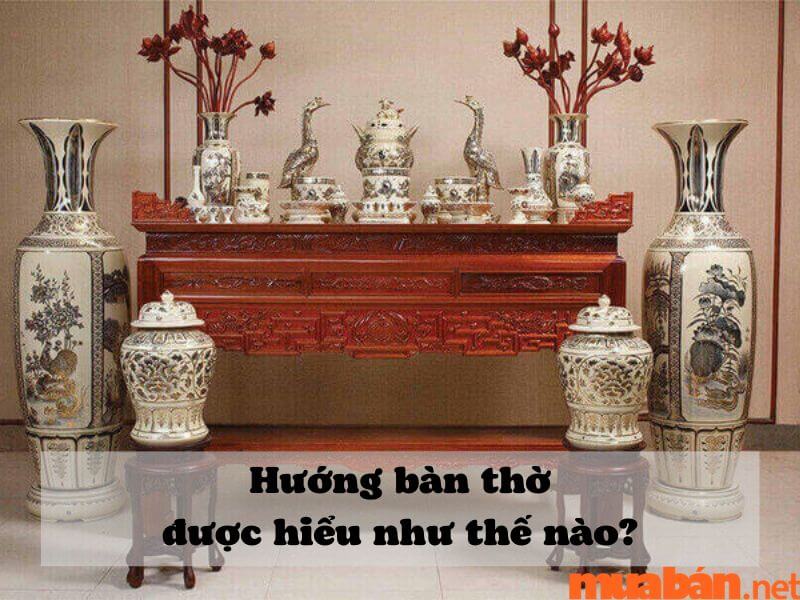
2. Factors affecting the choice of altar direction
To determine the correct direction to place the altar, it is necessary to rely on the age of the owner. The altar is a spiritual place and is directly related to the harmony of destiny and the five elements of mutual birth. The owner is usually the head of the family and is male. If the father is old and weak, the son can replace the elderly father to build an altar. However, for families lacking a male destiny, it is also possible to choose the age of the woman who is shouldering the family to choose the direction.
Choosing the age to choose the direction of the altar is very important because only then will the worship be effective in feng shui. The right direction to place the altar will bring luck and fortune to the whole family.
>>> See more: Where should the worship room be placed in accordance with feng shui?
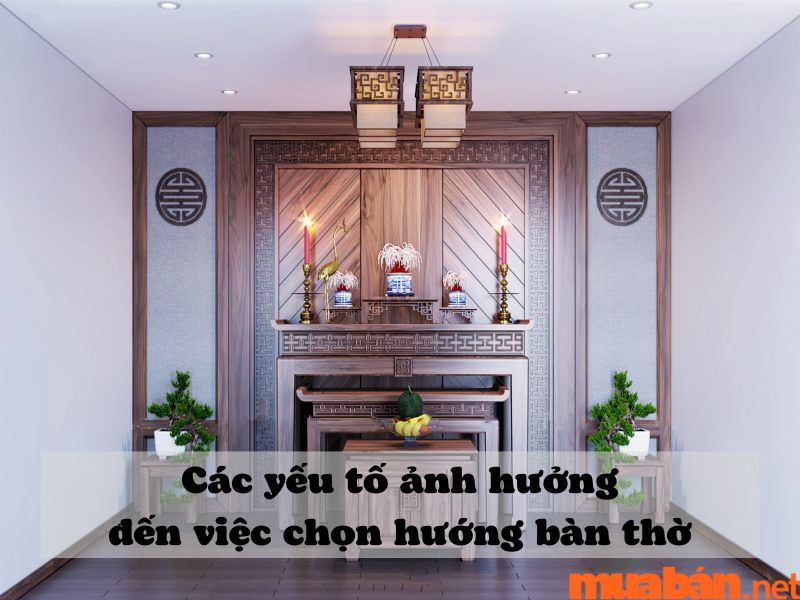
3. How to determine the direction of the altar
The altar also follows the principle of “One taste, two directions”, which means that the location is first, and then the beautiful direction. Then Which direction is the altar?
3.1. Choose the direction of the altar by age
In addition to prioritizing the best location, the direction of the altar must also match the age of the owner. Some azimuths of placing altars according to age are as follows:
- In the year of the Monkey, the Rat, and the Thin, the altar should be placed in the North (Ty) direction, the Southeast (the Thin) direction, and the East (the Rabbit) direction.
- In the age of the Rabbit, the Goat, and the Pig, the altar should be placed in the North (Mui) direction, the East (the Rabbit), and the Southeast (the Thin) direction.
- In the years of the Rat, the Ox, and the Rooster, the altar should be placed in the East (the Rabbit) and the North (the Ox).
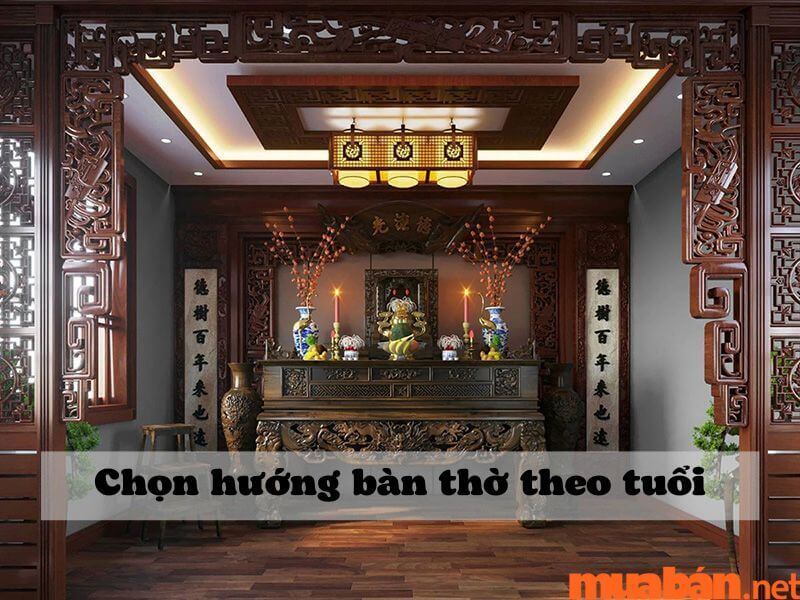
3.2. Choose the direction of the altar according to the destiny
The owner’s destiny can be found from the age. From there you can sow hexagrams Eight trigrams and determine which is a good direction to place the feng shui altar. However, it should be noted that the horoscope and feng shui par are completely different. We have two types of feng shui fortune cards as follows:
- The first is the East and the West
Those who belong to the elements of Wood, Water, and Fire will be Dong Tu Menh. West quartet is a person belonging to the element Kim, Tho.
- The second is East Tu Trach and West Tu Trach
The directions such as East, Southeast, South, and North will be East, Tu Trach. West Four Trach will be the West, Northwest, Southwest, Northeast.
After determining the age of the destiny, we combine these two hexagrams together.
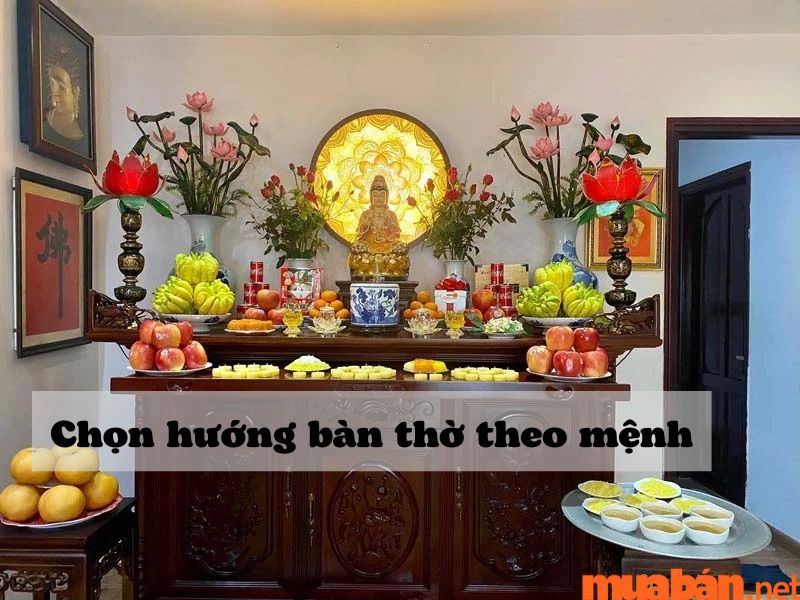
4. Direction of different types of altars
4.1. Direction to place the Buddha altar
The Buddha altar should be placed in accordance with the house so that the worship space is the most sacred and solemn. The best direction to place the Buddha altar is towards the main door, so that the front door will be bright and bring good fortune into the house. Absolutely do not place the Buddha altar near the toilet, near the walkway or facing the wall. This will affect negatively, even mean to offend the superior.
If worshiping both the Buddha altar and the ancestors, the Buddha statue should be placed one step higher. On it should place objects such as agarwood waterfall, bass nails and altar lamps symbolizing the light to illuminate the way.
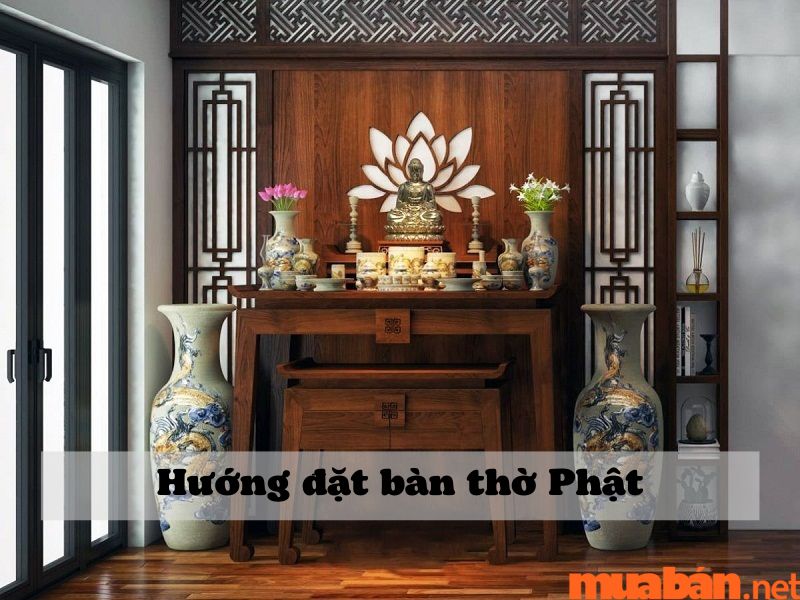
4.2. Direction to place the ancestral altar
According to feng shui, the direction to place the ancestors’ altar is determined according to the destiny of the person who is the head of the family:
- Homeowners of the Wood, Fire, and Thuy orders should place the altar in the East, South, North and Southeast directions.
- Owners of the Kim and Tho destiny should place the altar in the West, Southwest, Northwest, and Northeast directions.
>>> See more: Instructions on How to Make a Beautiful And Feng Shui Altar Do You Know?
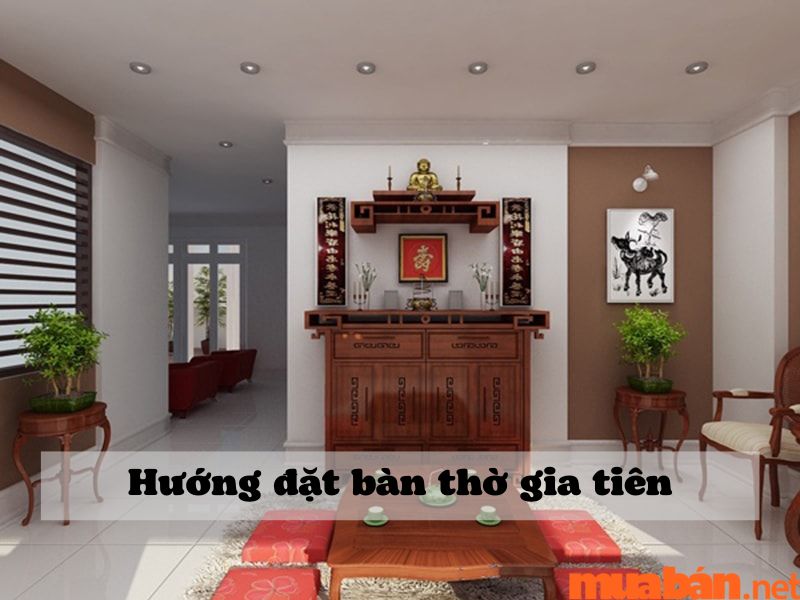
4.3. Direction to place the altar of the god of wealth and earth
Many people wonder whether to place the altar of the god of fortune facing the door? The altar of God of Wealth and Earth is a place to bring fortune and luck to the owner. So the altar should be placed towards the door to attract fortune. Usually the altar should be placed against the wall or screen to create a stable position, implying to bring peace and prosperity to the whole family.
>>>For more information: The most correct way to worship the local god of wealth every day

4.4. Direction to place the altar of Mr. Tao (kitchen)
The altar of Mr. Tao should be placed solemnly in the kitchen of every family. As for the direction, the altar of Ong Tao can be placed parallel to the kitchen or facing the kitchen. The altar should be placed close to the stove and avoid the direction of the toilet. Usually, the South direction is the most suitable direction to place the altar of Mr. Tao in the kitchen.
Many families do not put the altar of Mr. Tao in the kitchen, so they can burn incense at the altar of the ancestors.

4.5. Direction to place the altar of the apartment building
Depending on the space and location of each apartment apartment but there are 2 ways to place the altar as follows:
- Firstly, the location of the altar is usually hung on the wall, suitable for small apartments that want to save space.
- Second: use the altar like other households, usually applied in spacious and comfortable apartments.
According to feng shui experts, the best apartment altar placement directions that homeowners should choose are Dien Nien, Sinh Khi, Thien Y and Phuc Vi.
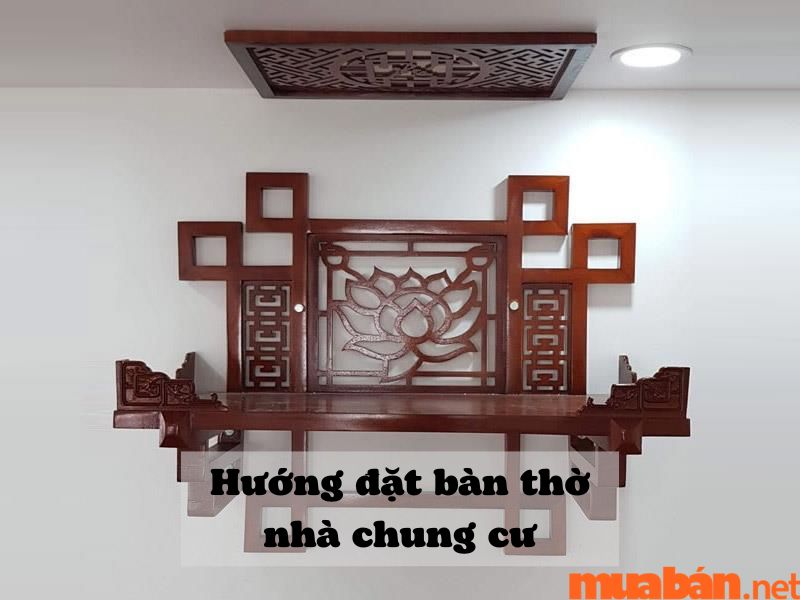
5. Taboos when choosing the direction of the altar
Choosing the direction of the altar is a sacred thing, greatly affecting spiritual worship in the house, so homeowners should note the following taboos:
- Do not place the altar right in the aisle, making noise and losing the purity of the place of worship.
- Do not place the altar in the southwest facing northeast.
- Do not place the altar in the East, Southeast facing West.
- Do not make used wooden altars.
- The ancestral altar should not be placed in the center of the house because it is hung. However, the Buddha altar is still possible.
- The image of the deceased should not be placed higher than the altar.
- Do not place the altar close to the bathroom to lose the sacred atmosphere.
- Do not place the altar in the direction of the Five Demons: Southwest and Northeast.
- Do not place the altar on top of the cabinet.
- The altar of God and the altar of Buddha can be placed together, but the incense bowls should not be placed close to each other.
- An ancestral altar and a Buddha altar should not face each other in the same room.
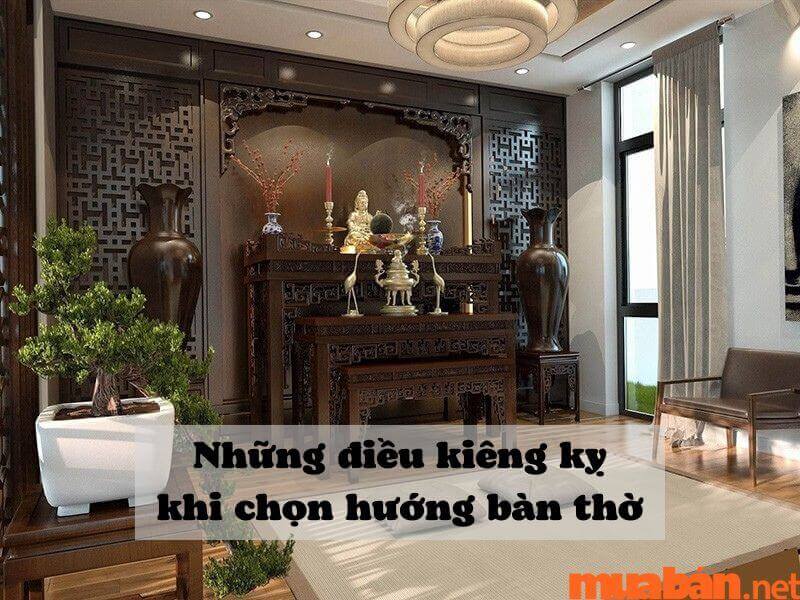
6. What to do if the altar is placed in a bad direction?
If the homeowner accidentally places the altar in a bad direction, it can still be resolved by making an offering to change the direction of the altar.
6.1. How to neutralize the bad altar direction
In the Bat Trach feng shui, it is said that each age has 4 good directions and 4 bad directions:
- 4 good directions: Vitality, Dien Nien, Thien Y, and Restoration.
- 4 bad directions: Harmful, Absolute Destiny, Luc Kill, Five demons.
Therefore, when arranging the direction of the altar, the homeowner should pay attention to the principle of “Locating sand – Huong Cat” which means a good position and a good direction is calculated according to the age of the owner. Normally, you should be based on the age and year of birth in the lunar calendar to calculate the supply of life according to the Bagua.
- Mosaic: 1
- Wise: 2
- Chan: 3
- Cost: 4
- Candle: 6
- Length: 7
- Chan: 8
- Cup: 9
- Particularly 5 are Can (female) and Khon (male).
The way to calculate destiny is also very simple, you can refer to the following way:
Add the last 2 digits of the year of birth, if the result is two digits, continue adding until the final result is a number from 1 to 9. Call this number a.
- For male destiny, we take 10 – a to calculate concubine.
- For female destiny, we take 5 + a to calculate concubine. (If it’s 2 digits, continue adding until you get a digit from 1 to 9).
For example, if the owner was born in 1998, we have the following calculation:
Take 9 + 8 = 17. Continue to take 1 + 7 = 8.
- For male destiny, we take 10 – 8 = 2 (Kun sign).
- For female par, we take 5 + 8 = 13. Then continue to take 1 + 3 = 4 (Sun Palace).
After calculating the destiny, it should be noted that:
- If the owner belongs to the East par of the four pars: Kham, Ly, Chan, Ton, the altar should be placed in the East and Four Trach directions: South, North, East and Southeast.
- If the owner belongs to the West par of the four parities: Can, Can, Doai, and Khon, the altar should be placed in the West direction, which is West, Northwest, Southwest and Northeast.
- Feng shui has a taboo related to the Southwest and Northeast directions that we should not place the altar in the Southwest facing Northeast and vice versa.
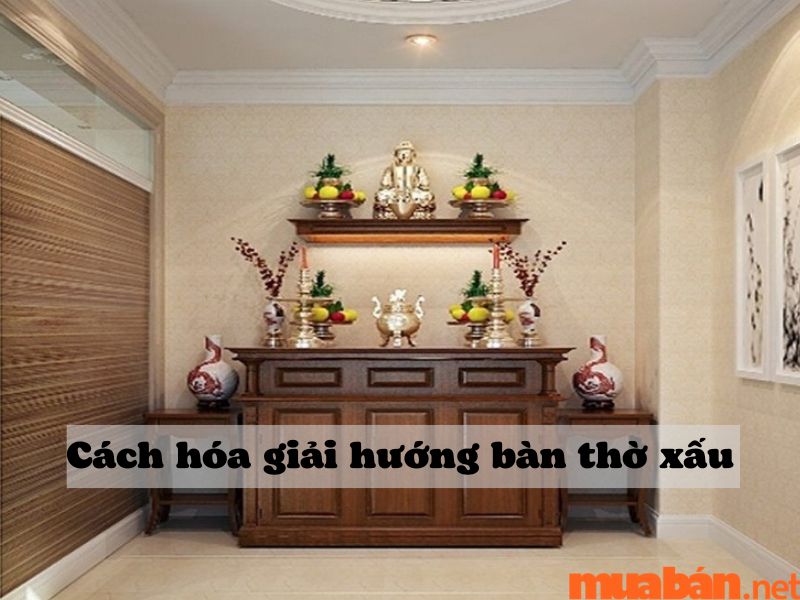
6.2. Procedure to redirect the altar
Moving the direction of the altar is only done when absolutely necessary. Because the altar is a place to worship gods, Buddhas and ancestors, it should be dignified and pure. Therefore, when it is necessary to move the direction of the altar, it is necessary to follow the correct procedure so as not to lose the “fortune” that the superior gives.
See the date of moving the altar
The movement of the altar should be done on auspicious hours and auspicious days. Therefore, considering the date of moving the altar is the first thing that the homeowner needs to pay attention to. The date of the move must be a good day, in accordance with feng shui, destiny and age with the owner. This both helps smooth navigation and improves luck.
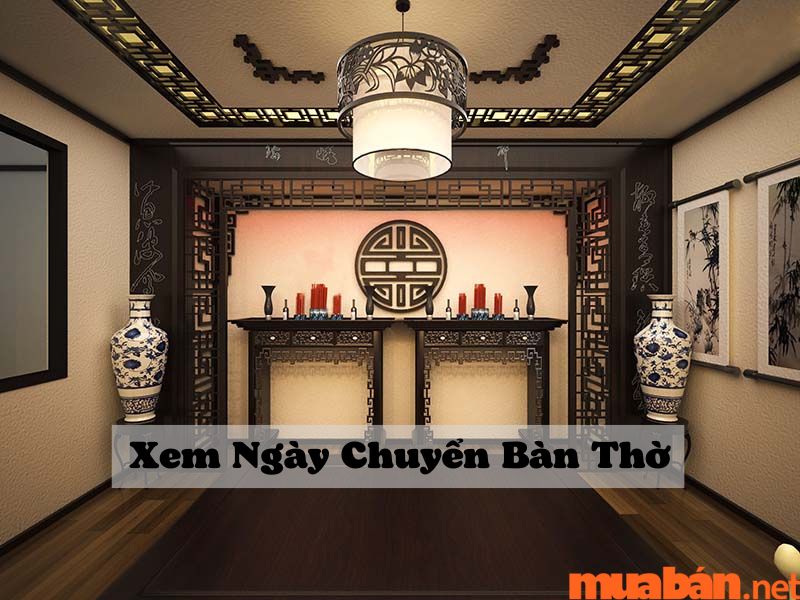
Worship tray to move the altar
The altar offering tray should have the following items: Boiling plate, wine, boiled chicken, votive paper, clothes, betel nut, clean water, and fruit. In fact, depending on family conditions, the owner can add or subtract gifts, but they must be decent.
>>> See more: How to worship in the inn, should you worship at the inn?
Prayer to move the altar
After clearing the altar, the homeowner needs to read the vows to move the altar. When reading, read aloud, clearly and coherently. The text of the petition is as follows:
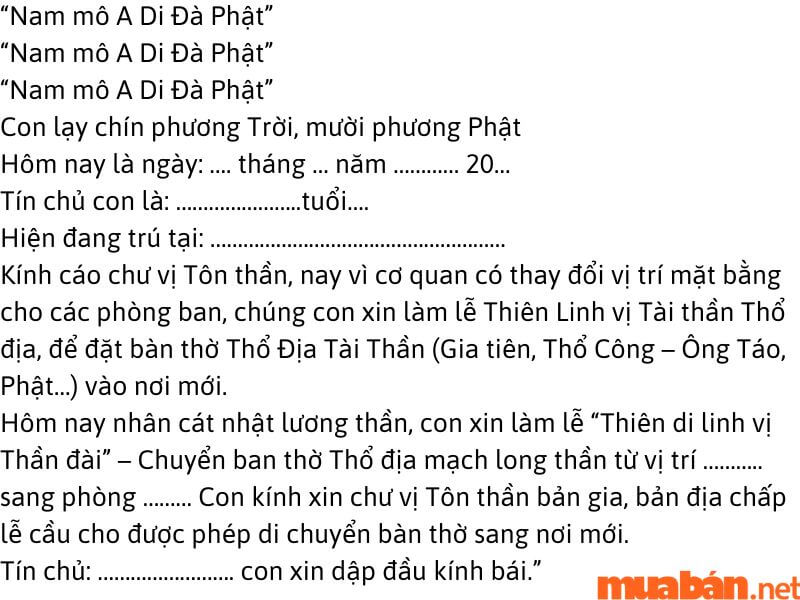
After reading the vow, the householder needs to bow down and wait until the incense has burned out, then give thanks and turn to gold. Then move the altar to a new location.
Prayer of thanksgiving after moving the altar
After moving the altar, it is necessary to light a new pure incense. After the incense burns ¼, the homeowner needs to read the following vows to give thanks:
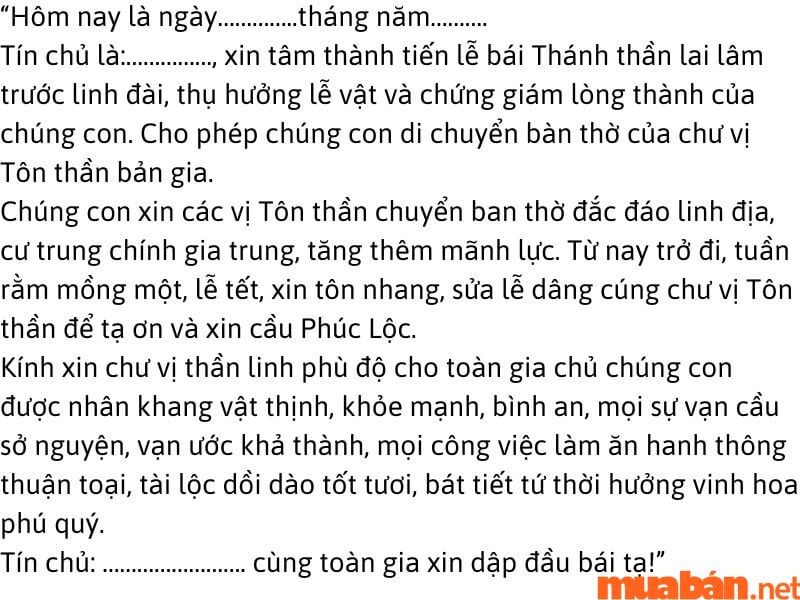
After the altar transfer ceremony ended, the new owner turned gold and ate a meal.
Here is the information about direction of the altar and altar redirect procedure that you can refer to. Hopefully through the article can be useful to you and don’t forget to leave a comment if it is successful. Access Muaban.net for market updates buy and sell real estateas well as house feng shui, … okay!
>>> See more:
- The Order of Lighting Incense In The House Standard Meaning and Spirituality You Should Know
- The most complete vows to the ancestors and gods on weekdays and monthly